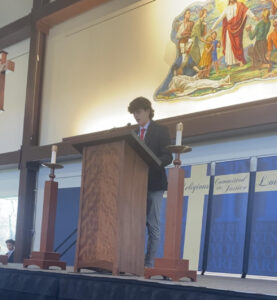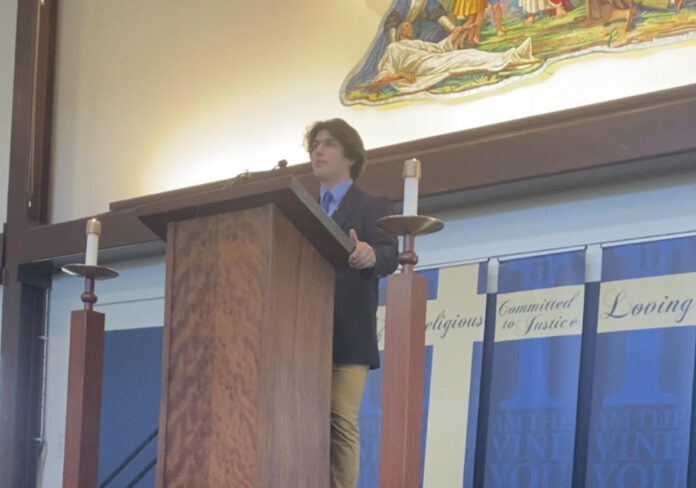On Tuesday, January 10, The Godly Guys hosted the first all-school prayer service for the year. The main theme for the prayer service was to try and understand your identity with Christ and how in the new year you can grow your relationship with God. The Jesuit community was told that at first, we are children and followers of God and that we are to spread God’s love and grace to everyone.
Jack Bradshaw’s Thoughts on the Prayer Service
Jack Bradshaw and Luke Santoni are both juniors who participate in Godly Guys. They gave reflections on how scripture tells us about our identity with Christ.
Jack Bradshaw said, “I was inclined to speak for a variety of reasons, but the most significant reason was the opportunity to share lessons I have learned at Godly Guys with my Jesuit community. My primary thought while crafting my reflection for this prayer service was: how can I share my mistakes for others to learn from? With this in mind, I hoped my message resonated with all Jesuit students who have placed their identities into worldly identities that only cause stress, anxiety, and disappointment. Lastly, within Godly Guys, I have created some of the most genuine, Christ-centered relationships I have at Jesuit. Specifically, Mr. Goll, who is one of the founding teachers for Godly Guys, is one of the most positive, caring, and helpful teachers I have ever had at Jesuit.”
Mr. Goll’s Insight on the Prayer Service
Mr. Goll, Mr. Berry, and Mr. Ellis helped found the Godly Guys’ prayer group for juniors. He helps students grow in their faith through their weekly meetings and helped organized the prayer service.
Why do you think the theme of the prayer service is important for the Jesuit community this year?
At the start of each new year, we should spend some time in reflection and examine the previous year to see who we were, how we grew, what we learned about ourselves. So, with our prayer service this year in embracing our identity with Christ is designed for our Godly Guys members to encourage the Jesuit students to no longer see yourself as what you do in your GPA or your extracurriculars, but rather as how God defines you and sees you. So, my hope for the Jesuit community is that we embrace that message and that we truly try to approach everyone with an image and child of God in mind because when we do that we truly get to embrace that love of the Jesuit community. So, that was my hope for Godly Guys starting the first prayer service of the year.
Why do you think that Godly Guys and other prayer groups are beneficial for Jesuit students?
I think in our daily lives we are bombarded by noise; we have busy schedules and we are constantly distracted. Essentially because we are so busy and distracted we tend to forget what truly matters and that is that God put us on this Earth to glorify him. So, groups like Godly Guys, Faithful Fellows, and the freshman prayer group want to provide the opportunity in where students can embrace their faith and grow in their relationship with Christ. That journey looks different for everyone, but I think one of our callings as educators is to provide that opportunity and to encourage students to learn and seek suffering that is hard in life so we can talk about it together. So, all of these things become more possible and more fruitful in clubs that dedicate time to these types of things.

Here are the transcripts of Jack Bradshaw and Luke Santoni’s reflections:
Jack Bradshaw:
Good Afternoon. My name is Jack Bradshaw, and I am a junior as well as on the soccer team and a part of Godly Guys. After reading Ephesians 1: 1-14, I began to recognize the similarities between the struggles of the Ephesians and the struggles I have in my everyday life. I believe that the messages Paul conveyed to the Ephesians can also be applied to my life as a Jesuit student. One message in particular that I believe applies to my life right now is that identity in God is an identity that cannot be earned. This idea is commonly misconstrued in society today, due to people placing their identity in their achievements. I specifically see Paul attempting to reveal this message through his repeated use of the word “destined.” Where destined implies that a true identity rooted in Christ is not something that can be earned, but a grace given by God that we must accept and utilize as the foundation of our life. Although our natural tendency is to place our value in merit-based achievements, Paul is encouraging us to recognize that our destiny is in Christ alone.
What does this new identity look like? An identity firmly rooted in christ is the only identity that can provide a stable foundation for our lives. However, a misplaced identity will only lead to frustration and disappointment. I have seen this in my life when I place my identity into other pursuits. Such as a GPA, SAT Score, or athletic performance. Although all hard work and worldly pursuits are worthy of pride and best efforts, there is a fine line to where these achievements become more than accomplishments and they become your identity. These fleeting achievements will lead to a short term feeling of success and satisfaction, but in the end, they will always fade away. Furthermore, sometimes in our misguided society and culture, the world encourages us to place our identity into worldly accomplishments. For example, we are told that fulfillment can only be achieved when we gain admission to our top choice college when we outcompete others and receive an award, but in reality, these momentary identities will not provide us with true and lasting satisfaction. With earthly identities, it will always be a never-ending search for fulfillment. Therefore, the apostle Paul encourages everyone to let go of the need to constantly prove your worth through achievements and accept Christ as our true identity, which will always lead to permanent fulfillment.
Accepting our identity in Christ is not the end, however. The apostle Paul outlines that we must live in a manner where others are capable of recognizing God’s grace in our lives. We must live as Christians, who base our identity in Christ, with forgiveness, kindness, and generosity in our hearts that is expressed through our language and actions. As a Jesuit student I not only think this would make our community more loving, but I believe this would strengthen the brotherhood we feel for every friend and peer we have at Jesuit.
Lastly, after researching this passage a little more I learned that the Greek translation of the Bible, Ephesians 1: 3-14 is actually the longest sentence in the entire Bible. I found this telling because it shows Paul, who was facing imprisonment, to be incapable of containing his own excitement regarding the message of embracing your identity in Christ. His abounding excitement is the type of excitement I would like to have in my life when discussing God’s grace. Therefore, I believe that if the Jesuit community can just speak as proudly about God’s grace as we do our hard-earned achievements, we will immediately begin to see a community that has been transformed by Christ’s love. My prayer for you is that you no longer associate your title with what you do but rather with who you are. From this moment on, may we embrace our shared identity as children of God. Thank You.
Luke Santoni:
Good afternoon. My name is Luke Santoni and I am a Junior at Jesuit. I am thankful for the opportunity to share my reflection over Ephesians 1:15-23 with you all today. After reflecting over this passage, here is my understanding of establishing an identity in Christ.
I think it’s safe to say that the end goal in all of our lives is satisfaction and fulfillment. There are countless ways to seek this satisfaction. Many of us, including myself, tend to be caught up with the belief that success in our lives, so to speak, depends on the action we take and the worldly things we achieve. That success is commonly gauged through material possessions like money or clothes as well as commendations like grades or popularity which are all ultimately fleeting and temporary. This doesn’t mean that what we achieve in our lives is meaningless, however it is inconsequential to the everlasting strength we find in God. I believe that the goal of our lives should not be to achieve for ourselves, rather how our talents and achievements can be used for the greater good of God’s community.
My dad always asks me how my hobbies or interests will better serve others. No matter what it is. For example, I enjoy going to the gym and working out. To me that is something that benefits me and my personal goals, yet my dad always asks me, “what is the end goal?” “how will that push you farther in life and how will it benefit those around you?” A lot of times I tell him that working out is just for my own satisfaction, but what he wants me to realize is that is not God’s goal. Taking care of yourself is important; your health is important, but the question is, “how do you utilize your blessings for others?”
“What is the end goal?” I believe the way is through faith. Through faith, we are enlightened. Enlightened to see the path we can take, outlined by Christ, to participate in God’s hope for His people and find our identity in Christ. As said in the passage, every one of us can attain “the riches of his glorious inheritance in his holy people,” yet, to me, that does not mean money or fame. God’s glorious inheritance is sharing in his fullness. It is creating an identity in Christ and with Christ. When we are faithless and therefore empty, God’s fullness is indeed hidden from us.
As said by the theologian John Shea, a lot of times we look for something or someone we can steal from, giving us a sense of power and cunning. However, God is “a vine with more wine than we can drink.” God is absolute abundance. At the same time, we also tend to “count God’s kisses”, tallying every blessing we receive as payment for every good deed we commit. My understanding is that personal reward is not the point, it is not a reward system and it is not a give-and-take relationship. God gives himself completely to us so we must give ourselves completely to Him. God freely ties himself to us, so we must do the same. Therefore, God is our absolute assurance. Sharing in God’s perfection is to accept our identity as a believer. God will accommodate us for where we are in our lives yet that does not mean we can do whatever we like. God’s hope for his people is for us to foster community and faith, establishing our unity with him.
To me, this passage ties a lot into the idea of who I want to become. As high schoolers with top tier education and support, at a school guided by Christian faith, you have every opportunity to explore your curiosities whether in sports, academics, art or any other aspect of life you find energizing. I believe that our main priority, though, is our identity in Christ. Do you view yourself as separate from Christ? If not, I invite you to think about what you can do to grow in unity with Him. And once you are, you can share in his “incomparably great power.” This is undoubtedly a challenging task that demands our selflessness and courage, however, there are groups and mentors in our Jesuit community that I have relied upon to further my journey with Christ and you can too. I think as a Jesuit community, we need to start asking ourselves and reflecting on the journey God presents us to reach unity in Christ. Although it will be a lifelong experience, creating an identity in Christ will make life joyful. Life will be abundant and our worries will be non-existent in the face of God’s assurance. I often think about the questions my dad asks me — “What’s the end goal?” Although I don’t know the answer quite yet, I do know that actively keeping in mind that the ultimate end goal must be the benefit of others will guide me on the path to walk with Christ. Thank you very much.
Conclusion
Lastly, the prayer service concluded with a reflection on how students can examine their current identity and how they can grow into an identity that is closer to God’s intentions for us. Thank you to all of the Godly Guys members who made the prayer service possible!
These are the two sections of scripture spoken about during the prayer service:
Ephesians 1:1-14
Ephesians 1:15-23
Stay tuned to The Roundup for more prayer service recaps!






